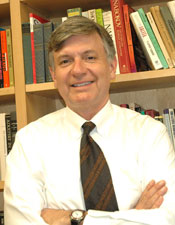 Although General William T. Sherman famously remarked, "War is all hell," the subject, nonetheless, has been fertile ground for some of the world's greatest literature. To that end, the depiction of armed conflict in modern literature will be the topic of a 2011 summer session course at CMC.
Although General William T. Sherman famously remarked, "War is all hell," the subject, nonetheless, has been fertile ground for some of the world's greatest literature. To that end, the depiction of armed conflict in modern literature will be the topic of a 2011 summer session course at CMC.
"War in Modern Literature," a planned course to be taught by CMC CMC professor of literature Nick Warner, will emphasize the tension between idealism and disillusionment that, according to Warner, marks most modern writing on war.
"We we will also explore other themes, including leadership, patriotism, ethical behavior in war, the meanings of courage and cowardice, loyalty and the causes and consequences of war," he says.
The course will begin with literature of the Civil War, examining works by Walt Whitman, Herman Melville, Stephen Crane, and by lesser-known authors from both the North and South. The syllabus will then turn to a selection of works dealing with World War I, World War II, and Vietnam, with some attention during the final week to depictions of the current conflict in Iraq.
Warner received his B.A. from Stanford and his M.A and Ph.D. from the University of California at Berkeley. He is also a five-time recipient of the Glenn R. Huntoon Teaching Award, and two-time recipient of the G. David Huntoon Senior Teaching Award.
We caught Professor Warner during some rare downtime between classes and fired some point-blank questions at him about his "War in Modern Literature" class. ***
CMC: What can students learn from the genre of war in literature?
Warner: Three great 20th century writers Ernest Hemingway, Isaac Babel and Vassily Grossman were all war correspondents who knew how to write about war in objective, factual terms. But all of them wrote fiction as a way of expressing more fully their sense of the lived reality of war, of the physical, emotional and psychological dimensions of war.
Literature can make us more aware of these dimensions, even if we have never experienced war ourselves, and can never hope to understand it in the way that those who have experienced it do. Moreover, many observers have noted that war evokes extremes of compassion and cruelty; in the literature of war we find writers depicting these extremes, and exploring some of the noblest and some of the most degraded instances of human behavior. In this way, literature raises profound questions not only about the nature of war but also about what it means to be humanand what it means to be inhuman. These are some of the things that students can learn from the literature of war. CMC: One would think that male students might be more attracted to the genre than female students. Do you find that to be true?
Warner: Yes, but only slightly. I have taught versions of this course three timesonce with equal enrollments of men and women, and twice where male students slightly outnumbered female students (11 men to 8 women and 9 men to 8 women). CMC: What do you consider to be the greatest piece of war-related literature?
Warner: For me, The Iliad remains unsurpassed. It is both a foundational text of western culture and an extraordinary depiction of nearly every aspect of war. I'm one of many who would agree with Caroline Alexander that The Iliad is "the greatest war story ever told" (in her recent book, The War that Killed Achilles). CMC: What is your personal favorite war-related work of literature?
Warner: I have already mentioned The Iliad. Beyond that my admiration extends to many works of fiction, drama, poetry, and film that deal with war.If I had to name favorites, I would begin with Tolstoy's War and Peace, Crane's The Red Badge of Courage, and the absolutely amazing, disturbingly beautiful stories in Babel's Red Cavalry. CMC: What is your favorite war film based on a novel or non-fiction work?
Warner: I don't have a favorite film based on a novel, but I do have a favorite war film: Jean Renoir's Grand Illusion. I admire the way that this profoundly moving, artistically compelling work weaves together so many different themes in relation to war: duty, social class, nationality and nationalism, self-sacrifice, comradeship, death. It's a powerful and timeless film. CMC: In your opinion, what does it take to be a "superior" teacher?
Warner: There are many different ways of being successful in the classroom. A lot depends on the training and personality of the instructor, the material, and the mix of students. But in general I believe that good teaching entails mastery of the subject; enthusiasm; fairness; clarity of communication; and a blend of intellectual rigor and compassion. Those are the qualities that I have seen in the teachers I admire most. *** This is the first in a series of stories about CMC faculty teaching during the 2011 Summer Session. For additional information on this course, please visit Professor Warner's profile page for his contact information and office hours.
CMC's 2011 Summer Session begins May 23rd and will offer both three- and six-week courses, all taught by CMC faculty.
War in Modern Literature Courseto be Offered in Summer Session
